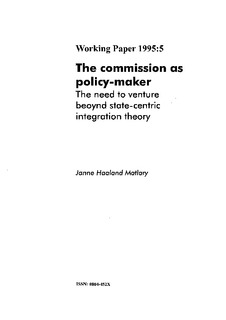The Commission as policy-maker: The need to venture beyond state-centric integration theory
Abstract
This article criticizes Andrew Moravcsik´s model of two-level states-EU interaction on three counts: it neglects EU actors, assumes the primacy of state actors, and further assumes that interests are formed prior to policy interaction at the EU-level. Empirical evidence of especially the Commission's role in the post-85 period is examined to show the independent actor role of the former. This forms the basis for the subsequent theoretical discussion of the role of non-state actors. The author argues the need for a multi-level model of integration and for a decomposition of the policy-process into the agenda-setting and the negotiation phases. She calls for a processual rather than actor-specific starting point since empirical events have obliterated the assumption of a domestic-international divide and thereby also of the primacy of the state as actor.
